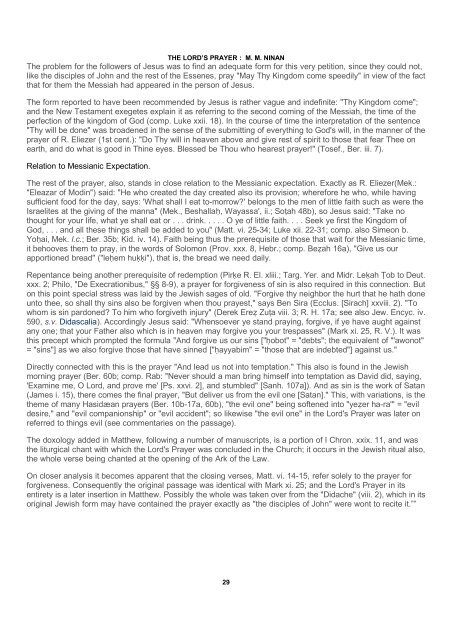Lord's Prayer
Create successful ePaper yourself
Turn your PDF publications into a flip-book with our unique Google optimized e-Paper software.
THE LORD’S PRAYER : M. M. NINAN<br />
The problem for the followers of Jesus was to find an adequate form for this very petition, since they could not,<br />
like the disciples of John and the rest of the Essenes, pray "May Thy Kingdom come speedily" in view of the fact<br />
that for them the Messiah had appeared in the person of Jesus.<br />
The form reported to have been recommended by Jesus is rather vague and indefinite: "Thy Kingdom come";<br />
and the New Testament exegetes explain it as referring to the second coming of the Messiah, the time of the<br />
perfection of the kingdom of God (comp. Luke xxii. 18). In the course of time the interpretation of the sentence<br />
"Thy will be done" was broadened in the sense of the submitting of everything to God's will, in the manner of the<br />
prayer of R. Eliezer (1st cent.): "Do Thy will in heaven above and give rest of spirit to those that fear Thee on<br />
earth, and do what is good in Thine eyes. Blessed be Thou who hearest prayer!" (Tosef., Ber. iii. 7).<br />
Relation to Messianic Expectation.<br />
The rest of the prayer, also, stands in close relation to the Messianic expectation. Exactly as R. Eliezer(Mek.:<br />
"Eleazar of Modin") said: "He who created the day created also its provision; wherefore he who, while having<br />
sufficient food for the day, says: 'What shall I eat to-morrow?' belongs to the men of little faith such as were the<br />
Israelites at the giving of the manna" (Mek., Beshallaḥ, Wayassa', ii.; Soṭah 48b), so Jesus said: "Take no<br />
thought for your life, what ye shall eat or . . . drink. . . . . O ye of little faith. . . . Seek ye first the Kingdom of<br />
God, . . . and all these things shall be added to you" (Matt. vi. 25-34; Luke xii. 22-31; comp. also Simeon b.<br />
Yoḥai, Mek. l.c.; Ber. 35b; Ḳid. iv. 14). Faith being thus the prerequisite of those that wait for the Messianic time,<br />
it behooves them to pray, in the words of Solomon (Prov. xxx. 8, Hebr.; comp. Beẓah 16a), "Give us our<br />
apportioned bread" ("leḥem huḳḳi"), that is, the bread we need daily.<br />
Repentance being another prerequisite of redemption (Pirḳe R. El. xliii.; Targ. Yer. and Midr. Leḳah Ṭob to Deut.<br />
xxx. 2; Philo, "De Execrationibus," §§ 8-9), a prayer for forgiveness of sin is also required in this connection. But<br />
on this point special stress was laid by the Jewish sages of old. "Forgive thy neighbor the hurt that he hath done<br />
unto thee, so shall thy sins also be forgiven when thou prayest," says Ben Sira (Ecclus. [Sirach] xxviii. 2). "To<br />
whom is sin pardoned? To him who forgiveth injury" (Derek Ereẓ Zuṭa viii. 3; R. H. 17a; see also Jew. Encyc. iv.<br />
590, s.v. Didascalia). Accordingly Jesus said: "Whensoever ye stand praying, forgive, if ye have aught against<br />
any one; that your Father also which is in heaven may forgive you your trespasses" (Mark xi. 25, R. V.). It was<br />
this precept which prompted the formula "And forgive us our sins ["ḥobot" = "debts"; the equivalent of "'awonot"<br />
= "sins"] as we also forgive those that have sinned ["ḥayyabim" = "those that are indebted"] against us."<br />
Directly connected with this is the prayer "And lead us not into temptation." This also is found in the Jewish<br />
morning prayer (Ber. 60b; comp. Rab: "Never should a man bring himself into temptation as David did, saying,<br />
'Examine me, O Lord, and prove me' [Ps. xxvi. 2], and stumbled" [Sanh. 107a]). And as sin is the work of Satan<br />
(James i. 15), there comes the final prayer, "But deliver us from the evil one [Satan]." This, with variations, is the<br />
theme of many Hasidæan prayers (Ber. 10b-17a, 60b), "the evil one" being softened into "yeẓer ha-ra'" = "evil<br />
desire," and "evil companionship" or "evil accident"; so likewise "the evil one" in the <strong>Lord's</strong> <strong>Prayer</strong> was later on<br />
referred to things evil (see commentaries on the passage).<br />
The doxology added in Matthew, following a number of manuscripts, is a portion of I Chron. xxix. 11, and was<br />
the liturgical chant with which the <strong>Lord's</strong> <strong>Prayer</strong> was concluded in the Church; it occurs in the Jewish ritual also,<br />
the whole verse being chanted at the opening of the Ark of the Law.<br />
On closer analysis it becomes apparent that the closing verses, Matt. vi. 14-15, refer solely to the prayer for<br />
forgiveness. Consequently the original passage was identical with Mark xi. 25; and the <strong>Lord's</strong> <strong>Prayer</strong> in its<br />
entirety is a later insertion in Matthew. Possibly the whole was taken over from the "Didache" (viii. 2), which in its<br />
original Jewish form may have contained the prayer exactly as "the disciples of John" were wont to recite it.””<br />
29


















